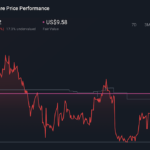C3.ai (AI 3.16%) shares bounced around after the enterprise artificial intelligence (AI) software company reported its latest quarterly results. The action in the stock likely confused some investors, as the stock soared in after-hours trading immediately after its report, only to open the next morning in negative territory. The stock then solidly rebounded into positive territory.
Overall, the stock has been on a strong run since mid-November and is trading up about 45% on the year as of this writing, erasing early year losses.
Let’s take a closer look at the tech company’s recent earnings report to see why the stock has been bouncing around and whether now is a good time to buy the stock.
Disappointing subscription growth and guidance
For its fiscal second quarter of 2025, ended Oct. 31, C3.ai’s revenue jumped to $94.4 million. The company has seen a consistent acceleration of year-over-year revenue growth over the past year and half, going from 11% in Q1 of fiscal 2024 (ended September 2023) to 21% growth last quarter, before hitting 29% revenue growth in its fiscal Q2.
| Metric | Q1 ’24 | Q2 ’24 | Q3 ’24 | Q4 ’24 | Q1 ’25 | Q2 ’25 |
|---|---|---|---|---|---|---|
| Revenue growth (YOY) | 11% | 17% | 18% | 20% | 21% | 29% |
Data source: C3.ai earnings reports. YOY = Year over year.
Total quarterly revenue came in comfortably above the $88.6 million to $93.6 million the company had previously forecast. Subscription revenue, meanwhile, climbed 22% year over year to $81.2 million.
C3.ai said that excluding income from Baker Hughes, its revenue surged 41%. The company thinks the partnership will be extended, but it is still deciding whether or not to renew its exclusive marketing agreement within the oil and gas industry when it comes up for renewal in June 2025. It said Baker Hughes revenue has been diminishing over the years and was just 18% of its total in the quarter, down from 35% in fiscal 2023.
Part of the reason the company is mulling whether to renew the deal is that it just signed a new partnership with Microsoft that will run until March 2030. Under the deal, all its solutions will now be available on Azure and Microsoft salespeople will get commissions, quota credit, and special bonuses on Azure C3 AI sales. Microsoft will also subsidize C3 AI pilots and C3 AI production deployments on Azure as part of the deal.
The company said it closed 58 deals in the quarter, including 36 pilots. Pilots are short three- to six-month term contracts during which customers can try out its service, upon which it then hopes to move them into production. C3.ai is also seeing momentum in the federal sector. The company said the government has begun a push to adopt AI solutions, especially in the areas of defense and intelligence.
The company’s gross margin came in at 61.3%, up from 56.1% a year ago and 59.8% last quarter. Its adjusted gross margin, which takes out stock-based compensation expenses, was around 70%. Subscription gross margin was only 56.8% for the quarter, up from 53.5% a year ago.
C3.ai remains unprofitable, with the company posting an adjusted earnings-per-share (EPS) loss of $0.06. That was an improvement from the $0.13 loss it reported a year ago.
After reporting $7.1 million in free cash flow in Q1, the company turned to negative $39.5 million in free cash flow in the quarter. The company had previously forecast to be free-cash-flow-positive on the year, but it said that will no longer be the case as it instead invests in its Microsoft partnership.
C3.ai ended the quarter with $730.4 million in cash and marketable securities and no debt.
The company guided for fiscal Q3 revenue to be between $95.5 million and $100.5 million, representing 22% to 28% growth. It also increased its full fiscal year revenue guidance, taking it from a forecast of $370 million to $395 million to a new range of $378 million to $398 million.

Image source: Getty Images.
Is now a good time to buy C3.ai stock?
The most important thing to come out of the quarter for C3.ai was the Microsoft deal, which has the potential to be a game-changer. That said, we’ll have to see what the actual impact is for the company, as not all of these types of deals work out as well as they sound. It comes at a good time, though, with the Baker Hughes partnership in question and revenue from that deal not doing well.
At the same time, C3.ai is paying an exorbitant amount in stock-based compensation. Through the first six months of its fiscal year, its stock comp is $111.7 million versus $181.6 million in revenue. Over the past year, C3.ai’s share count has risen from 119.9 million to 129.1 million, a 7.7% increase, as a result of its high stock compensation. The company also has a very weak margin profile compared to most software-as-a-service (SaaS) stocks.
From a valuation standpoint, C3.ai trades at a forward price-to-sales (P/S) ratio that is just about 12 based on current fiscal-year analyst estimates.
AI PS Ratio (Forward 1y) data by YCharts
Given questions around the Baker Hughes partnership, its egregious use of stock compensation, and industry weak margins, I do not find its valuation particularly attractive at current levels. As such, I would not chase the stock after its big run at the end of this year, despite the positive progress the company is making.
Geoffrey Seiler has no position in any of the stocks mentioned. The Motley Fool has positions in and recommends Microsoft. The Motley Fool recommends C3.ai and recommends the following options: long January 2026 $395 calls on Microsoft and short January 2026 $405 calls on Microsoft. The Motley Fool has a disclosure policy.









